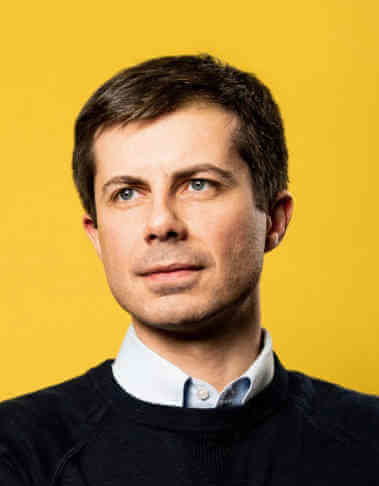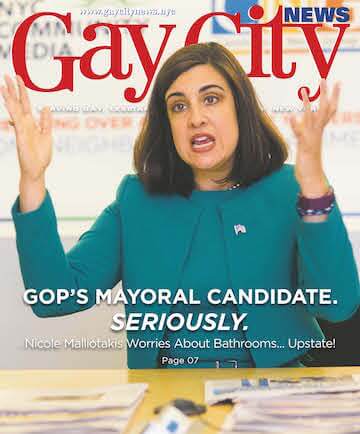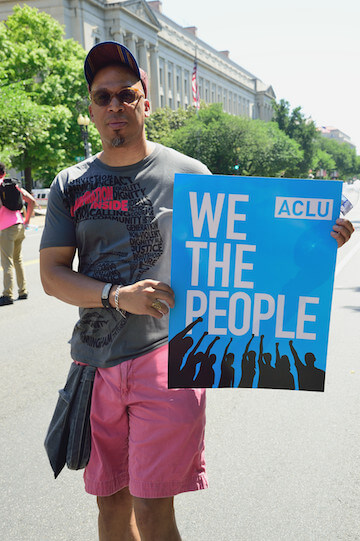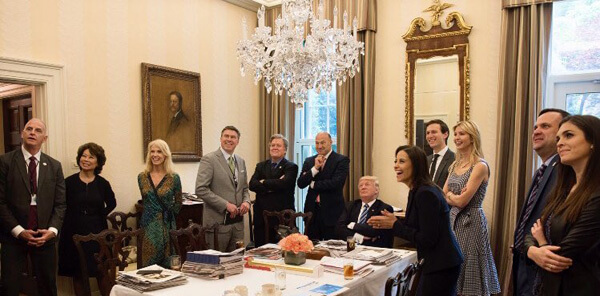Being the only minority in any public space isn’t a pleasant position. As president, Barack Obama put forth a relaxed public persona probably grounded, in part, on a fear that white voters would otherwise take him for a stereotypical “angry black man.” Pete Buttigieg goes out of his way to be inoffensive. The first out gay candidate for president to achieve traction on the campaign trail constantly emphasizes his military service, Christianity, and marriage. Buttigieg’s popularity says something about the progress we’ve made, but the fact that he relies so heavily on this carefully constructed image also shows its limits.
Early in his campaign, Buttigieg put himself on the map in part by targeting the homophobia of Vice President Mike Pence, a fellow Hoosier. One wonders how many heterosexuals, especially if they didn’t follow politics, knew just how extreme Pence’s beliefs are. In April, Buttigieg said, “If me being gay was a choice, it was a choice that was made far, far above my pay grade… And that’s the thing I wish the Mike Pences of the world would understand. That if you got a problem with who I am, your problem is not with me — your quarrel, sir, is with my creator.”
Buttigieg couched a welcome public challenge to the Christian right’s homophobia and Trumpist hypocrisy in Christianity itself. It’s likely that his critique of Pence and Trump’s homophobia and sexual immorality has reached religious people who never would have listened to the same sentiments from an agnostic or atheist or a democratic socialist politician like Ilhan Omar or Alexandria Ocasio-Cortez.
Running for president, as much as becoming an actor or musician, means commodifying and objectifying oneself. (When he said he disapproved of Chick-fil-A’s politics but liked their chicken, was he expressing an honest opinion or shoring up his “one of the guys” credentials? As a stranger observing his campaign, it’s impossible to tell.) Buttigieg’s memoir “Shortest Way Home: One Mayor’s Challenge and a Model for America’s Future” reads like a marketing exercise. The upbeat, charming persona he conveys in interviews comes through, as well. But it’s evasive in damning ways. Although he went to work for the consulting firm McKinsey after graduating from Harvard, “Shortest Way Home” only conveys the vaguest sense of McKinsey’s business or his role there. The firm is actually quite scummy, having helped Purdue Pharma get America hooked on opioids and whitewash the reputation of countries like Saudi Arabia and China. His military service is treated in such a cursory manner that one could suspect he really joined because he thought it would help his political career. Buttigieg barely mentions being gay until the last quarter of the book. And he downplays the pain of staying in the closet until 33, telling an uplifting tale of his romance and marriage to his husband Chasten instead.
Nathan J. Robinson wrote an epic-length, very cogent critique of Buttigieg’s politics and life path for Current Affairs. His point can be summed up, as “This man is the story of the American elite.” Buttigieg has talked in vague platitudes for most of his campaign and avoided putting any policy proposals on his website for months. When he has stated concrete positions, they’re as centrist as Joe Biden’s. His website now states that he only favors free public college for lower-income students and “Medicare for All for those who want it,” rather than expanding the system to offer truly universal coverage. He thinks Chelsea Manning belongs in jail: so much for LGBTQ solidarity. His reputation for intelligence is based on speaking seven languages, playing indie rock songs on piano, and reading “Ulysses,” not his political ideas.
You would think that an essay that declares, “The office of the presidency is so totally bankrupt of positive political potential that in many ways it doesn’t actually make a difference who captures the democratic nomination,” would engage in a concrete way with Buttigieg as a politician the way Robinson did. But Greta LaFleur’s “Heterosexuality Without Women,” published by the Los Angeles Review of Books’ blog, offers a queer critique of Buttigieg and his husband that casually wipes out their actual experience. She starts out analyzing Time magazine’s cover of the couple, pointing out its resemblance to Norman Rockwell paintings and assumption that they have a right to a place in the White House (which she links to their white privilege).
LaFleur is on target when she mentions that “there’s actually no sex at center stage here. And that is part of the point.” But the heteronormativity she describes isn’t the same as heterosexuality, though LaFleur uses various rhetorical dodges about the difference between criticizing a photo and dissing the people in it. She claims “this little essay is not a critique… this is not a campaign against Pete Buttigieg.” But forget about Buttigieg and think about his less powerful husband — a man whose brother still rejects the legitimacy of his gayness somehow isn’t gay enough for her, either, and his marriage to the mayor is essentially masturbatory “doppel-banging.”
Jacob Bacharach’s essay for the Outline, sporting the clickbait headline “Why Pete Buttigieg is bad for gays,” also criticizes Buttigieg’s presentation of his sexuality from a leftist perspective. If I agree with his final point that “it is hard to escape the way that American capitalism and American democracy have worked in tandem both to dissipate and to assimilate the radical democratic energies of queer liberation by giving a very circumscribed sort of gay a conditional membership to the club,” the fact that Bacharach defines contemporary gayness by Grindr usage is troubling. Gay men are hypersexualized by heterosexuals. It doesn’t help when we join in. No one would expect a photo of Beto O’Rourke and his wife to put sex at center stage.
LaFleur and Bacharach, however, look like very insightful social critics next to Dale Peck, whose attempt at sounding like the bitterest and pissiest queen from “The Boys in the Band” before making the dubious claim that Buttigieg is bound to screw around if he gets elected president because he came out in his 30s got “canceled” from the New Republic’s website within a day of its publication.
Buttigieg is trying to win a game set by rules that heterosexuals wrote. (In an interview quoted in Jeremy W. Peters’ article, “Pete Buttigieg’s Life in the Closet,” for the New York Times, he links the closet to his political ambition; his assumption that being openly gay in the 2000s would’ve prevented him from getting elected mayor of a Midwestern town is probably correct.) Could a gay socialist get very far in the presidential race? Could someone who says, “I’m proud of being queer,” while openly polyamorous? These are two different issues, but they’ve been conflated by many of Buttigieg’s critics. America sees gayness as a form of cultural and political rebellion — or thinks it should be — rather than a simple way of existing. Buttigieg challenges that narrative, but as privileged as he is, a man who didn’t feel that it was possible to be open about his sexuality until his 30s and lives in a state where it’s legal to fire someone for being gay is still part of a real minority.
In a different piece for The New Republic, Charles Dunst suggests that “Queerness will never hinge on one’s presentation, political opinions, or the level to which one embraces or rejects the mainstream… the Buttigiegs have the right to be traditionally married and conventionally masculine without facing the forfeiture of their queerness.” Without defending Buttigieg as a politician, it’s obvious that his vanilla image is a defense against the sexual stereotypes gay men face. Queer liberation should lead to a world that destroys such stereotypes while also making it perfectly acceptable not to be married or monogamous — yet some liberationist arguments risk setting up a new, equally exclusionary set of rules for queer people to follow. Buttigieg’s sudden rise as one of the most famous gay men in the US — and one of the few such celebrities outside the arts — raises question about the meaning of LGBTQ identity that resonate far beyond one man and his campaign.


































